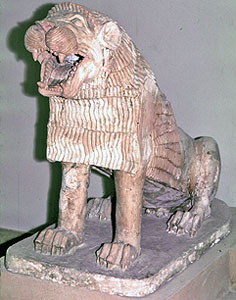HIS 111
Unit 3: Ancient Near East
 |
Ancient
Babylonian Lion Statue; fierce not gentle; ready to rip you to shreds not take a nap; photo courtesy C. Wayne and
Dorothy Miller (my wife's grandparents). I have some other photos
of Baghdad for you to look at. All of these were taken in the
mid-1960s, long before the troubles that beset the Iraqis. |
 What you must do in this unit
What you can do in this unit
What you must do in this unit
What you can do in this unit
- Have a look at my online exhibit on Egyptian religion.
- Check out Professor Campbell's video Was Ancient Paganism B.S.?
- Check out Professor Campbell's video Was Ancient Slavery B.S.?
- Review my notes and remarks on the Ancient Hebrews and the development of the idea of ethical monotheism from my HIS 101 course.
- Repatriation: who legally owns artifacts discovered and/or excavated from sites around the world?
- Often within the course, you will find an extra credit option to answer study questions on the unit's reading (see below for the link to the Gilgamesh study questions). Your answers to study questions should not be simple yes/no answers, but they should be thorough answers. Here is a link to an example of outstanding study question answers done by one of the students in HIS 112. Please notice the completeness of each answer.
Some videos that you can watch for this unit
Extra Credit Options
- For up to 25 points of extra credit, write a one-page paper (maybe
two pages if they are exceptional) that provides a detailed comparison of Gilgamesh and Genesis. You may wish to read more
of Genesis for your comparison.
- For up to 10 points of extra credit, read Hammurabi's Code of Laws and write a paragraph explaining the social structure of Ancient Babylon.
- For up to 10 points of extra credit, read The Precepts of Ptah-Hotep, c. 2200 BCE,
and write a paragraph explaining Ptah-Hotep's understanding of how to live one's life.
- For up to 10 points of extra credit, read the Genesis excerpt and write a paragraph answering this question, Did Genesis describe
an ethical religion, i.e. a religion that demanded moral behavior?
- For up to 5 points of extra credit,
you can submit the answers to the Gilgamesh study questions. Please write in formal, complete sentences.
- For extra credit, please suggest a
relevant website for this unit of the course. Send your instructor the title of the site, the URL and a brief explanation why you find the information interesting and applicable to the material being studied this unit.
Unit Learning Objectives
- Upon successful completion of this unit, you will be able to (1) describe the foundation and growth of Egyptian and Mesopotamian societies and (2) analyze a historical primary source.
|

